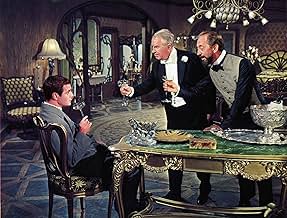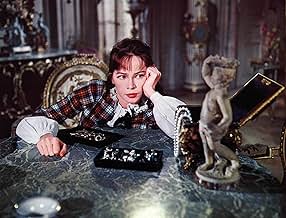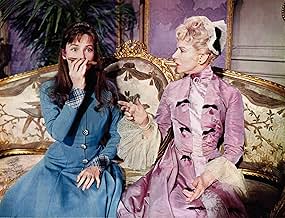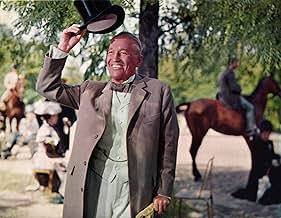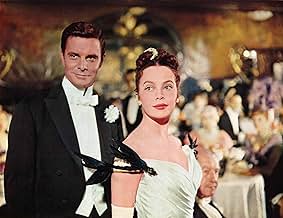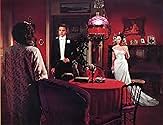AVALIAÇÃO DA IMDb
6,6/10
26 mil
SUA AVALIAÇÃO
Cansado das convenções da sociedade parisiense, um playboy e uma jovem desfrutam de uma amizade platônica, mas não por muito tempo.Cansado das convenções da sociedade parisiense, um playboy e uma jovem desfrutam de uma amizade platônica, mas não por muito tempo.Cansado das convenções da sociedade parisiense, um playboy e uma jovem desfrutam de uma amizade platônica, mas não por muito tempo.
- Direção
- Roteiristas
- Artistas
- Ganhou 9 Oscars
- 22 vitórias e 9 indicações no total
Marie-Hélène Arnaud
- Girl at Maxim's
- (não creditado)
Jack Ary
- Waiter at "Palais de Glace"
- (não creditado)
Daniel Aubé
- A boy at Jardins des Tuileries
- (não creditado)
Richard Bean
- Harlequin
- (não creditado)
Cecil Beaton
- Gentleman in Park
- (não creditado)
Jacques Bertrand
- Maitre d'Hotel Maxim's
- (não creditado)
Margaret Bristow
- Showgirl
- (não creditado)
Paul Cristo
- Restaurant Patron
- (não creditado)
Hubert de Lapparent
- Gaston's Private Secretary
- (não creditado)
Cilly Feindt
- Girl on Horseback at Pré Catelan
- (não creditado)
- Direção
- Roteiristas
- Elenco e equipe completos
- Produção, bilheteria e muito mais no IMDbPro
Avaliações em destaque
...and thank goodness. Despite the good songs, the movie version of "My Fair Lady" hits a dull thud. In the words of Gaston Lachaille, "it's a bore!"
But this review isn't about "My Fair Lady". It's about one of the greatest musicals ever to be placed on cellulod - "Gigi", exquisite and as light as air!
Where do you start? The score and musical direction by Conrad Salinger and Andre Previn is one of the best. Vincente Minelli's direction frames Leslie Caron and Louis Jourdan wonderously and builds the chemistry between the two photogenic stars. Great support is provided by Hermione Gingold and the redoubtable Maurice Chevalier. Paris has never looked as glorious on film as this - amazing costume design, art direction, and set pieces.
And the songs - absolute classics! Lerner and Loewe really hit their stride with this - "Thank Heaven for Little Girls", "I Remember It Well", "The Night They Invented Champagne", and the beautiful title tune.
This movie has often served as an introduction to Maurice Chevalier for movie watchers, and he illuminates the screen. If you want to see him in another of the greatest musicals, watch "Love Me Tonight" with Jeanette MacDonald.
Thank heaven for this movie - it's a world that I would love to inhabit! I give it 10 out of 10.
But this review isn't about "My Fair Lady". It's about one of the greatest musicals ever to be placed on cellulod - "Gigi", exquisite and as light as air!
Where do you start? The score and musical direction by Conrad Salinger and Andre Previn is one of the best. Vincente Minelli's direction frames Leslie Caron and Louis Jourdan wonderously and builds the chemistry between the two photogenic stars. Great support is provided by Hermione Gingold and the redoubtable Maurice Chevalier. Paris has never looked as glorious on film as this - amazing costume design, art direction, and set pieces.
And the songs - absolute classics! Lerner and Loewe really hit their stride with this - "Thank Heaven for Little Girls", "I Remember It Well", "The Night They Invented Champagne", and the beautiful title tune.
This movie has often served as an introduction to Maurice Chevalier for movie watchers, and he illuminates the screen. If you want to see him in another of the greatest musicals, watch "Love Me Tonight" with Jeanette MacDonald.
Thank heaven for this movie - it's a world that I would love to inhabit! I give it 10 out of 10.
Directed by Vincente Minnelli and starring Leslie Caron as the title character, "Gigi" (1958) is nothing short of sweet and delightful. Gigi is a coltish teen in 1900's Paris who lives with her grandmother Madame Alvarez (Hermione Gingold) and who loves to hang out with family friend Gaston Lachaille (Louis Jourdan), an international jet-setter and playboy whose every relationship is documented in the papers. The pseudo-narrator of the film is Henri Lachaille (Maurice Chevalier), Gaston's uncle and a notorious playboy in his own right, who loves to give his nephew relationship advice, solicited or not. Gigi is being bred by her grandmother and aunt to become a refined woman so she can become a mistress for rich and powerful men, so it comes as both a surprise and delight to the women to discover that Gaston may be a suitable candidate. However, Gigi's innocence may not allow this to happen, as she struggles with making the transition between carefree girl to a refined lady with social responsibilities.
Musicals are a rare genre on my "films I adore" list, but "Gigi" has long been a favorite film of mine, despite its sappy moments and sometimes corny jokes. What makes "Gigi" such a good film is its unmitigated Charm with a capital "C"; one can't help but grin a little when Chevalier sings "Thank Heaven for Little Girls" because he doesn't stop flashing that high voltage smile himself. And I cannot get through the scene between Chevalier and Gingold when they sing "I Remember it Well" by the seaside without tearing up because it is just so damn cute. Sure, the revelations and epiphanies are pretty easy and kind of out of nowhere, but considering it is an MGM musical from the 1950's, I would be surprised if there weren't these kinds of things. Everyone in the film looks like they are having a good time (particularly Chevalier), and the great Lerner-Loewe music against the Parisian backdrop is enough to sell me.
"Gigi", while being a 10-time Oscar winner (including Best Picture) has unfortunately been marginalized by some as a typical MGM fluff piece, could be a hard sell, particularly to the jaded Generation Y - and - younger audience. However, since I myself am probably one of the most cynical film-viewers I personally know of, take my word for it "Gigi" is a lot of fun, and a good way to spend two hours. 8/10 --Shelly
Musicals are a rare genre on my "films I adore" list, but "Gigi" has long been a favorite film of mine, despite its sappy moments and sometimes corny jokes. What makes "Gigi" such a good film is its unmitigated Charm with a capital "C"; one can't help but grin a little when Chevalier sings "Thank Heaven for Little Girls" because he doesn't stop flashing that high voltage smile himself. And I cannot get through the scene between Chevalier and Gingold when they sing "I Remember it Well" by the seaside without tearing up because it is just so damn cute. Sure, the revelations and epiphanies are pretty easy and kind of out of nowhere, but considering it is an MGM musical from the 1950's, I would be surprised if there weren't these kinds of things. Everyone in the film looks like they are having a good time (particularly Chevalier), and the great Lerner-Loewe music against the Parisian backdrop is enough to sell me.
"Gigi", while being a 10-time Oscar winner (including Best Picture) has unfortunately been marginalized by some as a typical MGM fluff piece, could be a hard sell, particularly to the jaded Generation Y - and - younger audience. However, since I myself am probably one of the most cynical film-viewers I personally know of, take my word for it "Gigi" is a lot of fun, and a good way to spend two hours. 8/10 --Shelly
Having seen this film several times, I definitely have to rate Gigi as one of the most charming musicals ever made. The delightful score, by Lerner & Loewe, includes songs such as "I Remember it Well," "The Night They Invented Champagne," "Thank Heaven For Little Girls," as well as the title track, "Gigi," sung with surprising candor and earnestness by Louis Jourdan. Although reminiscent of their work on My Fair Lady, this score not only stands beautifully on its own but also grows in depth with each viewing.
The three principals, Leslie Caron, Louis Jourdan, and Maurice Chevalier, along with the Paris locales helps maintain a distinctively French flavor, especially in the way the characters relate and interact.
For everyone who has commented on the political incorrectness of the story, a closer look will actually reveal the true feminist perspective of Colette's work which was groundbreaking for its time: 1) the story is a commentary and observation of the limited social and economic options for women outside of marriage during the turn of the century Paris, 2) Although Gigi (Caron) never fully masters her lessons and grooming, she is able to capture Gaston's (Jourdan) heart precisely because of her imperfections, and 3) most importantly, it is Gaston rather than Gigi who is forced to truly transform himself and defy the social conventions of the time to bring the story to its resolution.
Compare this to My Fair Lady, which offers similar social commentary but resolves itself in a more standard way: For example 1) Eliza Dolittle only becomes noticeable and lovable after transforming her outward appearance and speech patterns 2) Although Professor Higgins finally realizes his love for Eliza at the end, it is Eliza who is forced to submit her will by effecting a reconciliation that does nothing to resolve any of the issues raised in the scenes leading up to that point.
Definitely see Gigi and judge for yourself. (By the way, the widescreen version is sooooo much better. This is especially apparent in numbers such as "I Remember It Well" where entire characters are forced to be cut out of the screen.)
The three principals, Leslie Caron, Louis Jourdan, and Maurice Chevalier, along with the Paris locales helps maintain a distinctively French flavor, especially in the way the characters relate and interact.
For everyone who has commented on the political incorrectness of the story, a closer look will actually reveal the true feminist perspective of Colette's work which was groundbreaking for its time: 1) the story is a commentary and observation of the limited social and economic options for women outside of marriage during the turn of the century Paris, 2) Although Gigi (Caron) never fully masters her lessons and grooming, she is able to capture Gaston's (Jourdan) heart precisely because of her imperfections, and 3) most importantly, it is Gaston rather than Gigi who is forced to truly transform himself and defy the social conventions of the time to bring the story to its resolution.
Compare this to My Fair Lady, which offers similar social commentary but resolves itself in a more standard way: For example 1) Eliza Dolittle only becomes noticeable and lovable after transforming her outward appearance and speech patterns 2) Although Professor Higgins finally realizes his love for Eliza at the end, it is Eliza who is forced to submit her will by effecting a reconciliation that does nothing to resolve any of the issues raised in the scenes leading up to that point.
Definitely see Gigi and judge for yourself. (By the way, the widescreen version is sooooo much better. This is especially apparent in numbers such as "I Remember It Well" where entire characters are forced to be cut out of the screen.)
The ability to do fine musicals was one of Hollywood's endearing traits. However, in Gigi they produced a GREAT musical that is in a class by itself. The score, the libretto, the costumes, photography et al won Oscars and deserved them.
However, the cast led by Caron and Chevalier all deserved a special Oscar. They were cast perfectly and performed to perfection. Could there be a better Gigi than Caron? Her ability to go from a charming child to a beautiful women is overwhelming. The songs that Chevalier has made into classics, appear to have been written especially for him. Could one visualize any other personality performing these songs?
Jourdan is perfect in his role and so is Gingold. Thank heaven!!! Lastly, I must pay homage to that city on the Seine. It is the ultimate star and should have gotten a special award.
I agree with those readers that have called Gigi the best Hollywood musical; it is really the perfect musical. Thank heaven!!!
However, the cast led by Caron and Chevalier all deserved a special Oscar. They were cast perfectly and performed to perfection. Could there be a better Gigi than Caron? Her ability to go from a charming child to a beautiful women is overwhelming. The songs that Chevalier has made into classics, appear to have been written especially for him. Could one visualize any other personality performing these songs?
Jourdan is perfect in his role and so is Gingold. Thank heaven!!! Lastly, I must pay homage to that city on the Seine. It is the ultimate star and should have gotten a special award.
I agree with those readers that have called Gigi the best Hollywood musical; it is really the perfect musical. Thank heaven!!!
Don't get me wrong, I love it - Leslie Caron and the whole cast. And the songs are superb.
But let's face it, this is Americanized Collette. She celebrated the deals and compromises within a sexist order that allowed a lucky few high-class prostitutes to become well-to-do, independent women in fin-de-siecle Paris (and a lot of others to at least make some kind of living). She empowered women, at a time when there just weren't many other opportunities for them to establish real independence (our current categories of PC and non-PC wouldn't have meant much then). It wasn't always pretty, but there was reality in her writing about relations between the sexes that hasn't lost its relevance.
Of course, this had to be soft-pedalled for the American audience - hence the ending, which conforms nicely with middle-class morality on this side of the Atlantic. This is the only "politically" unsatisfactory thing about the movie, however. And it remains superior - both "politically" and as a film - to My Fair Lady, where Eliza is implied to return and submit herself to Rex Harrison at the end, whereas Gigi at least implies that it's Gaston rather than Gigi who is going to have to change his ways.
My only other gripe: Why no dancing from Leslie - and from Vincente Minelli, that peerless director of dance sequences? I guess Lerner and Lowe must have been more in control of this one, and weren't of a mind for rug-cutting. Too bad - there really isn't nearly enough of Leslie dancing on film as it is!
But let's face it, this is Americanized Collette. She celebrated the deals and compromises within a sexist order that allowed a lucky few high-class prostitutes to become well-to-do, independent women in fin-de-siecle Paris (and a lot of others to at least make some kind of living). She empowered women, at a time when there just weren't many other opportunities for them to establish real independence (our current categories of PC and non-PC wouldn't have meant much then). It wasn't always pretty, but there was reality in her writing about relations between the sexes that hasn't lost its relevance.
Of course, this had to be soft-pedalled for the American audience - hence the ending, which conforms nicely with middle-class morality on this side of the Atlantic. This is the only "politically" unsatisfactory thing about the movie, however. And it remains superior - both "politically" and as a film - to My Fair Lady, where Eliza is implied to return and submit herself to Rex Harrison at the end, whereas Gigi at least implies that it's Gaston rather than Gigi who is going to have to change his ways.
My only other gripe: Why no dancing from Leslie - and from Vincente Minelli, that peerless director of dance sequences? I guess Lerner and Lowe must have been more in control of this one, and weren't of a mind for rug-cutting. Too bad - there really isn't nearly enough of Leslie dancing on film as it is!
Oscars Best Picture Winners, Ranked
Oscars Best Picture Winners, Ranked
See the complete list of Oscars Best Picture winners, ranked by IMDb ratings.
Você sabia?
- CuriosidadesWhen Alan Jay Lerner met Leslie Caron in London to discuss the film with her, he was surprised to discover that Caron, who was of French birth, had become so immersed in the English culture that she had lost her French accent.
- Erros de gravaçãoDuring Gaston's song by the pond thinking of Gigi, there is a fence in the pond forcing the swans to stay in close background. The swans, obviously confused yet undeterred, keep swimming into the fence attempting to get to the swan in deep background on the other side of the pond.
- Citações
Aunt Alicia: Love, my dear Gigi, is a thing of beauty like a work of art, and like a work of art it is created by artists. The greater the artist the greater the art. And what makes an artist?
Gigi: Cigars and jewelry?
Aunt Alicia: Gigi, you're from another planet.
- Versões alternativasIn some prints shown on television, we see still photos of Leslie Caron part of the time during the song "Gigi", instead of seeing Louis Jourdan singing. (This occurs after the verse and first chorus, when the orchestra plays the song while Jourdan only exclaims "Gigi!") As shown currently, we see Jourdan singing throughout the whole song, as in the theatrical release.
- ConexõesEdited into Histoire(s) du cinéma: Une histoire seule (1989)
- Trilhas sonorasThank Heaven for Little Girls
(uncredited)
Lyrics by Alan Jay Lerner
Music by Frederick Loewe
Performed by Maurice Chevalier
Principais escolhas
Faça login para avaliar e ver a lista de recomendações personalizadas
Detalhes
- Data de lançamento
- País de origem
- Idiomas
- Também conhecido como
- The Parisians
- Locações de filme
- Venice Beach, Venice, Los Angeles, Califórnia, EUA(beach scenes)
- Empresa de produção
- Consulte mais créditos da empresa na IMDbPro
Bilheteria
- Orçamento
- US$ 3.319.355 (estimativa)
- Faturamento bruto mundial
- US$ 789
- Tempo de duração
- 1 h 55 min(115 min)
- Cor
- Mixagem de som
- Proporção
- 2.35 : 1
Contribua para esta página
Sugerir uma alteração ou adicionar conteúdo ausente


